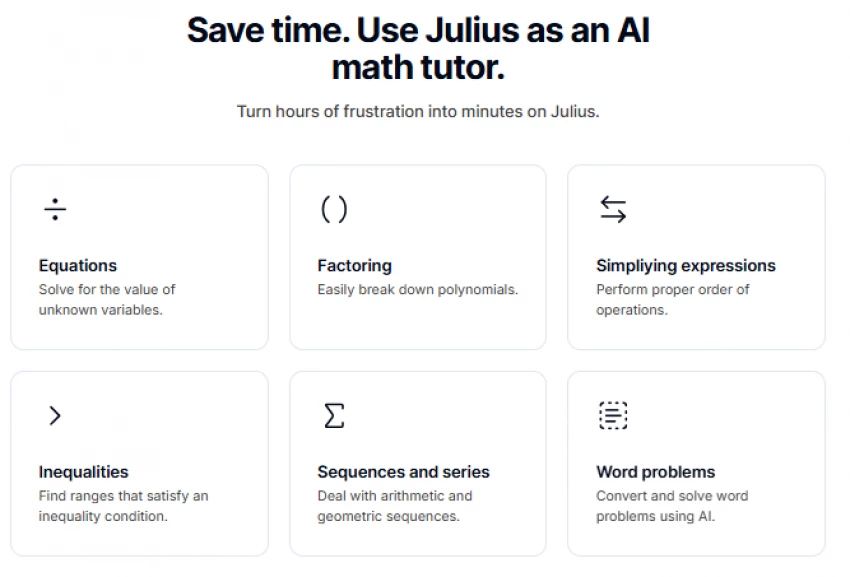

Julius AI isn’t your average chatbot—it crunches numbers, decodes data, and might even ace your homework. See if it’s the genius sidekick you need.
Julius AI isn’t here to write you a love poem about the moon or brainstorm your next viral TikTok. No — this bot is laser-focused on something most of us have tried to avoid since high school: math and data.
It claims to be the AI that will solve your equations, clean your datasets, and make sense of your messy spreadsheets without sighing dramatically. Bold promises in a market drowning in chatbots that “can do it all.” But can Julius actually back it up?
Let’s meet the AI that would rather read your spreadsheets than your diary.
While most AI models aim to dazzle with creativity, Julius AI seems almost allergic to fluff. Its priorities are clear: math, analysis, and research.
At its core, Julius is a multi-purpose AI assistant with some unique quirks:

Wait until you see how it actually flexes its weird data superpowers.
Julius doesn’t just read spreadsheets — it inhales them. Give it a dataset and it’ll identify trends, perform calculations, and spit out visualizations that would take a human hours.
Its AI Math module is where the magic happens.

We’re talking:
The kicker? It explains the steps, which means you can turn in your work with some plausible deniability if your professor asks how you got the answer.
But can all that number love actually make it better than ChatGPT in a fight? Let’s find out.
This isn’t a fair fight — ChatGPT is a generalist, while Julius was built to eat math problems for breakfast.
In a ResearchGate comparison, Julius consistently beat ChatGPT in numeric accuracy and symbolic computation. Think of it like racing a Tesla against a mountain bike — sure, both move forward, but one’s just built for speed.
That said, Julius isn’t winning the creative writing contest anytime soon. ChatGPT still has the upper hand in storytelling, ideation, and, you know, sounding like a human who has seen a movie.
Before we crown a winner, we should talk about how much this little genius will cost you.
Julius works on a freemium model. The free tier gives you basic chat and math features, but heavy-duty computations, large dataset handling, and faster processing hide behind the paywall.
Pricing floats around $15/month for premium — cheaper than most streaming services, but unlike Netflix, it won’t ask if you’re still watching. It’s priced to be accessible for students and professionals without screaming “luxury purchase.”
If you’re a student though… that subscription might just pay for itself.
Students are already putting Julius to work for:
It’s a quiet revolution in academia, and yes, some professors are concerned. But let’s be real — if the tool exists, students will use it.
And if you’re in data science, Julius might even save you from another 400-line Python script.
For data professionals, Julius is like a friendly intern who doesn’t complain. It can:
It won’t replace your advanced models, but it can remove repetitive grunt work, freeing you up for the more complex stuff.
Which is why we should talk about the areas where it’s genuinely better than the competition.
Julius shines in:
It’s like the smug honor student of AI — and for good reason.
But every superhero has a weakness, and Julius is no exception.
Weaknesses? Sure:
So who’s actually the right kind of person to use this thing? Let’s be honest.
You’ll love Julius if you:
You’ll rage-quit if you:
And if you don’t believe me, let’s hear from the people who’ve actually tested it in the wild.
From Reddit’s Data Science corner to tech blogs, the feedback is consistent: great for math, underwhelming for creativity.
The verdict? Use it where it’s strong, don’t expect it to be your all-in-one AI.
But what if you want something like Julius but… not Julius? Let’s look at the competition.
Each has its niche. Julius fits into a tech stack rather than replacing one entirely.
So is it worth keeping in your arsenal, or should you just move on? Here’s my verdict.
Julius AI is a niche tool done right. If you’re in its target audience, it’ll feel like magic. If not, it’ll feel like an overqualified calculator.
It’s not here to replace ChatGPT or become your creative partner — it’s here to be the smartest number-crunching friend you’ve ever had. And in that role, it excels.
And if you’re still here, you’re exactly the kind of person who should give it a spin.
Be the first to post comment!